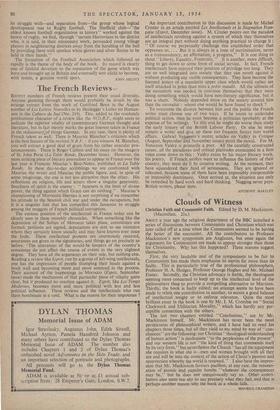Clouds of Witness
Christian Faith and Communist Faith. Edited by D. M. Mackinnon. (Macmillan. 21s.) ABOUT a year ago the religious department of the BBC launched a series of discussions between Communists and Christians which was later called off at a time when the Communists seemed to be having the better of the encounter. All the contributors to Professor Mackinnon's new symposium are Anglicans, but once again the arguments for Communism are made to appear stronger than those for Christianity. Why has this happened? Three reasons suggest themselves.
First, the very laudable zeal of the symposiants to be fair to Communism has made them emphasise its merits far more than its faults. This is particularly true of the professional philosophers, Professor H. A. Hodges, Professor George Hughes and Mr. Michael Foster. Secondly, the Christian advocacy is feeble, the theologians seeming more concerned to keep up to the intellectual level of the philosophers than to provide a compelling alternative to Marxism. Thirdly, the book is badly edited; no attempt seems to have been made to relate one contribution to another, to secure a good balance of intellectual .weight or to enforce relevance. Quite the most brilliant essay in the book is one by Mr. I. M. Crombie on "Social Clockwork and Utilitarian Morality," which has hardly any per- ceptible connection with the others. The last two chapters entitled "Conclusions," are by Mr. Mackinnon himself. Mr. Mackinnon has never been the most perspicuous of philosophical writers, and I have had to read his chapters three times, but all they yield to my mind by way of "con- clusions" are the following: our Christian "theological understanding of human action" is inadequate "to the perplexities of the present" and our western life is not "the kind of thing that commends itself by its very form," but nevertheless the Church "has all the equipment she requires in what she is—men and women brought with all they are and will be into the context of the action of Christ's passion and resurrection whereby the world is renewed." I also have the impres- sion that Mr. Mackinnon favours pacifism, at any rate, the renunci- ation of atomic and napalm bombs "whatever the consequences may be," but he does not unequivocally say so. Other contri- butors also seem too shy to say precisely what they feel, and that is 'perhaps another reason why the book as a whole fails.


































 Previous page
Previous page